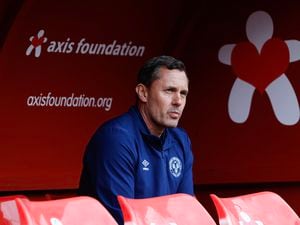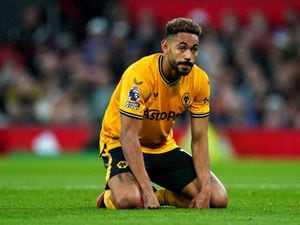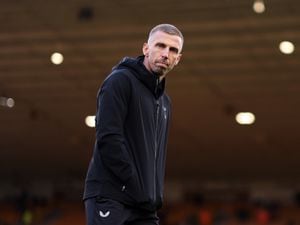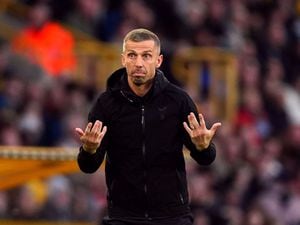Sky Sports' Johnny Phillips: Best laid plans can be blown apart by injuries injuries
Injuries kill off seasons. They can herald the death knell for those in charge, too.
Injuries remove control from a manager’s hands. There are many obstacles to drive the calmest of managers to distraction, but nothing upsets the mood more than injured players walking the corridors of a training ground.
One former player once articulated the attitude of Kenny Jackett to those who occupied the treatment table, in the starkest of terms. “Kenny was great,” he explained. “But if you got injured, he didn’t want to know. He’d only be interested if you could be of use to him.”
Nuno Espirito Santo is experiencing the first genuine injury crisis of his time at Wolves. It has derailed his plans, ushering in some below par performances which have become a cause for concern among a fanbase accustomed to new heights.
There is no danger that this particular period will do any damage to Nuno’s job prospects but, historically, there is a queue of managers with their own hard luck stories at Molineux when it comes to ripping up best laid plans.
Sir Jack Hayward’s first substantial injection of funds came in the summer of 1993. Graham Turner’s squad largely comprised of players from the Fourth Division rebuild, but he had admirably kept the team loitering around mid-table in the Second Division for a couple of years. Hayward’s money brought in Premier League quality like Peter Shirtliff, Kevin Keen, David Kelly and, most surprisingly of all, England midfielder Geoff Thomas, who had been coveted by Arsenal and Manchester City.
Turner’s team had bypassed midfield for much of his incumbency, but now there was another dimension. Or there was, until injuries did terminal damage to the manager’s plans. Already without injured talisman Steve Bull, Thomas suffered season-ending cruciate ligament damage during a 2-0 win at Sunderland in mid-September. The team did not win again until November.
With the early season impetus gone, the side never fully recovered. There was more to it than just the injuries, as Bull returned to hit some fine autumn form. But Thomas was unquestionably the most important cog in the new look side, and supporters never got to see what he could have done for Turner’s men.
Graham Taylor took over in March and his summer rebuilding in 1994 was different. He wanted Wolves to harness the spirit of the great 1950s side. For Johnny Hancocks and Jimmy Mullen, read Tony Daley and Steve Froggatt. The former England manager spent the bulk of his budget on the Aston Villa duo, with the aim of exploiting the pace of the wingers and getting a higher percentage of crosses in for Bull.
Before a ball had been kicked in the 1994/95 season, Daley’s Wolves career was in tatters. A knee injury ruled him out until October, before a 15-minute substitute appearance was curtailed by further knee ligament damage. He never played again that season, managing only a further 26 appearances in four years.
Froggatt started brilliantly, scoring the winner on the opening day of the campaign before, like Thomas, he fell victim of a cruel challenge, away at Reading in December. A madcap season ended in play-off failure with cult hero from the Fourth Division days, Robbie Dennison, back on the wing. When Taylor lost his job in November the following season, Froggatt was still missing. His star wingers never kicked a ball on the same pitch together.
Dave Jones succeeded where Turner and Taylor fell short. Two academy graduates tipped to go to the very top helped him win promotion in 2002/03, but come the much-anticipated Premier League season they were absent. Joleon Lescott missed just one league game of the promotion season but a knee injury ruled him out for the entire campaign. Meanwhile, goalkeeper Matt Murray played only the opening game, before succumbing to injury. Two of the defensive mainstays sidelined, leading to relegation as Wolves conceded more than two goals per game.
Of course, in all three cases there was more evidence when assessing the failures than mere injuries, but they played a huge part. With Raul Jimenez the principle casualty now, and spells on the sidelines for the supporting cast of Jonny, Willy Boly, Leander Denconcker and Daniel Podence, the current Wolves team is an imitation of its best days.
The glaring weakness lies in attack. The performances in drawing against Spurs and Brighton had enough to appreciate, but how often did fans find themselves ruing moves that broke down or chances missed in the knowledge that Jimenez could have improved each situation?
He is as irreplaceable now as Bull was back in the early 90s. But where to turn? There were two starkly contrasting loan replacements back in 1993/94. Turner opted for Mike Small, from West Ham United, initially. It was a short-lived experiment. Like Bull, Small was a physical presence but he was more nuisance value than goal threat. By March, with Turner gone and a slim chance of making the play-offs, Taylor struck gold with out-of-favour Villa striker Guy Whittingham. Eight goals in 13 games from ‘Super Guy The Soldier’ helped Wolves on their unlikely charge, as they fell just three points short.
This week’s thinking involves recalling players from loan spells rather than sending out for replacements, although with most of the month remaining there may yet be a substantial foray into a tricky market. Injuries can muddle thinking. Last resorts become first options. The search for solutions can lead down difficult roads that managers never really wanted to take.
Which brings us to Patrick Cutrone. To be clear, he is here out of necessity not choice. Nuno does not see him as a viable long-term option. But the situation – and finances come into this – has led to a fresh chance to resurrect a Wolves career that had not so much stalled as had its engine removed.
To a lesser extent, there is an early second opportunity for Morgan Gibbs-White, although his recall is a more pragmatic measure. It is Cutrone’s reappearance that will focus the attention. He left for Fiorentina aggrieved at the lack of opportunity but has not impressed in Italy. At 23, there is time to enjoy a long, successful career. And if Cutrone grasps this unexpected moment, there is still a slim chance of making a lasting impression at Molineux.





